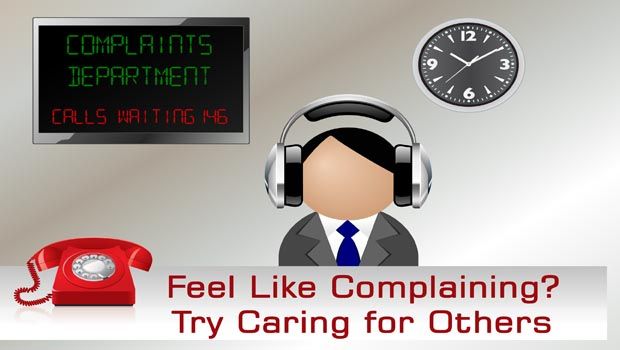A woman was married for fifty years. She was very dedicated to her husband, and she took care of him in an admirable way, so she thought. Then her husband had a heart attack and spent a week in the hospital. He underwent triple bypass surgery and was recuperating and just waiting until the doctor considered him well enough to go home. During the week in the hospital, the woman spent every day at the hospital with her husband. As the week progressed, she became aware of something that disturbed her greatly — her husband was incredibly demanding. Not only was he constantly asking for this or that from her, complaining, refusing food that didn’t appeal to him, or criticizing how he was being treated, that he shouldn’t have to wait for this or that and on and on. Yet not a word of appreciation or thanks. And he was doing the same thing with the nurses. This woman remembered something her daughter had told her years before, that she had the tendency to want to please everyone. And that she needed to learn to say “no” when too much was asked of her, to stand up assertively when someone was unfairly demanding things of her. Her daughter had also said that she needed to learn to think for herself and not constantly change her opinion, decision, or course of action because her husband or sister or friend told her to.
Finding a Healthy Balance
Now the wife of the man in the hospital realized that for all their married life she had met her husband’s every need, whim, and demand, in a mistaken belief that to do otherwise would be un-loving. She played her daughter’s words over and over in her mind. Finally, she was awakening to the reality that what she was doing was condoning irresponsible, selfish, lazy behavior. She realized that by taking care of her husband like she was the maid rather than his life partner, truest friend, and soulmate, doing things for him that he was capable of doing himself or should be doing himself, like picking up his wet towel and clothing from the bathroom floor, was not really a loving act but an act of indulgence that perpetuated and compounded his self-centered and demanding behavior like that of a spoiled child.
There are people who seem ready to help and serve those around them in every sort of way, big and small. This type of personality can become extreme and is sometimes referred to as a “people-pleaser personality.” But like everything in life, to be healthy and beneficial there must be a balance. Certainly, we want to help, assist, serve, and facilitate things for those we love and those we work with or even have casual friendships with. And we should do the best we can to provide for the needy and disadvantaged. Islam teaches us about the importance of serving others. Prophet Muhammad (s) said, “The highest level of the intellect, after eman, is to be of service to the creation.” Imam Hassan Al-Banna in his writings spoke about rescuing others from misery, protecting people from harm, providing them with what they need, contributing to the healing of other human beings and curing ill hearts. These are beautiful and benevolent sentiments and actions that we should emulate. But there are boundaries which, if crossed, do more harm than good, and leave both parties worse off. We can reflect on this hadith: “There should be neither harming nor reciprocating harm” (Ibn Majah and al-Daraquny). Being a people-pleaser is different from being kind and giving of oneself in a healthy and balanced way.
At the core of what differentiates them are two issues: 1) Are you harming yourself by overextending yourself, exhausting yourself, denying your own needs, neglecting yourself, your aspirations, your life? 2) Are you harming the other person by indulging them, denying them the opportunity to develop a healthy independence and self-reliance, not providing the corrective feedback that an individual needs when he/she oversteps the bounds of a balanced give-and-take in the relationship? If you answered “yes” to either one, then you may be suffering from the “people-pleaser” syndrome.
Important Tips
Here are some tips to make sure that you find your way back to the solid ground of kindness and benevolence, away from the edge of quicksand that a people-pleaser gets sucked into:
• Realize that you have to take care of your own basic needs or else you will get burned out in the long run. Then you are in no position to take care of or assist or help anyone else.
• Always remember that being a “people-pleaser” and being kind are two different things. Refusing to wait hand and foot on another person who constantly demands things of you is not being unkind or unloving. If the other person is being selfish and demanding, then standing up for your rights is the mature and fair thing to do.
• Practice being assertive in a balanced and healthy way. This can involve thinking ahead of time of what you can say when you get into a situation where you normally would just give or serve, and you realize now that it is not appropriate to do so. You can say something like, “I’ve realized that it would be better for both of us if you do that yourself.” Or “I’m just not willing to do that anymore because it makes me feel like I’m being taken advantage of.” Or “I’m sorry but I’m too (tired) (busy) (overwhelmed with other things) to do that now.”
• Recognize that it will take time for you to replace your people-pleaser habit with a new healthy habit. And it will also take time for your spouse/friend/co-worker/other to accept your new-found ways of interacting. If they react with some unkindness or disrespect, be patient and tolerant but stay committed to your goal.
• Cultivate the self-awareness that recognizes not only how you treat others but how you allow others to treat you. Feeling worthy and capable and honest requires that you don’t allow others to mistreat you or manipulate you. With a healthy self-awareness, you know your own worth and your own potential and expect that those who are close to you, whether a spouse or a friend or a co-worker or a parent, will treat you with respect and appreciation.
To reiterate — we can help, assist, serve, and facilitate things for those we love and those we work with or even have casual friendships with. And we should do the best we can to provide for the needy and disadvantaged. But let’s do that with a healthy, balanced attitude, approach, and commitment to the optimal well-being of ourselves and others.





